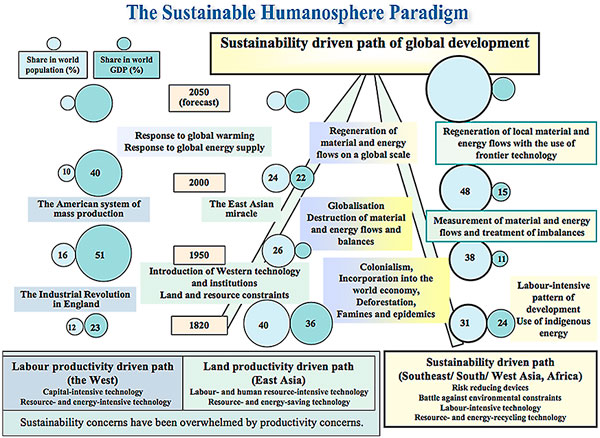Research Program
The modern European society developed the market economy and the institutional regime based on private property rights and the states system. Over the last two centuries, the capitalist system diffused worldwide, and economic actors regarded land, labour and capital as three main factors of production. The environment and various resources were often understood as either attachment of land, or a factor equivalent to, or translatable to, it.
But where severe environmental constraints prevail, it is not always sensible to focus human efforts on land for the purpose of raising labour productivity (leading to economic growth) or land productivity (leading to population growth). The more urgent task might be to secure the conditions in which their life will continue as envisaged, by responding to changes the nature suddenly brings and preventing catastrophes. They include monsoon failure and the lack of water, shortage of energy and other essential resources, prevalence of infectious diseases and other calamities. Social instabilities and war could follow. That many societies pursue a path of development with these concerns, rather than the growth of per capita income or population growth, in mind, is often noted and can be confirmed on the site of fieldwork in contemporary Asia and Africa. It had also been a norm for most human societies until a few centuries ago.

If we wish to understand how to deal with global environmental concerns and the related issues of energy supply for world population in the twenty-first century, we need to move away from the perspective of the private property rights regime, premised on “unmovable land”, to that of humanosphere, which takes into account the complex interactions of movable, changeable and transformable factors that affect the sustainability of local society. And we need to foster the institutions, which will ensure sustainable humanosphere at local, regional and global levels, and the value system which will support them. Only by doing so can we design a sustainability-driven path of local and regional development.
In order to substantiate the above claim, we plan to carry out the following four core projects.
Project 2 “Toward co-existence of human and nature” investigates the material and energy flows and conversions of local societies, and relates these observations and concerns for global environmental constraints to the more conventional issues on the interactions between man and nature. Results of measurement of carbon balances will be used for the formulation of local resource management of land, water and animals and plants. This then will be combined with rural sociological and anthropological studies, to arrive at the realistic program of local resource management consistent with both awareness of global constraints and the needs of local development.
Project 3 “The forestry model of sustainable humanosphere” attempts a comprehensive interdisciplinary study of local societies dependent on forestry products to examine the impacts of frontier technologies of molecular biology, wood engineering and forest science on: a) land use, b) commercial forestry, c) commercialization of forest waste, d) the growth of local towns, e) employment generation, f) changes in customary law, g) local administration and h) local politics. It seeks to develop the kinds of frontier science and technology that can draw out the capabilities engrained in local societies by working closely with them.
Project 4 “Studies in the potentialities of local culture, institution and technology” focuses on the identification of cultural, religious, social and institutional resources that have been accumulated in local societies for sustainable humanosphere and development. Cultures and value systems have been integral part of sustainability-driven path of development, and their significance in directing human behavior have been expressed in terms of diverse perceptions of human health, animals and plants, climate, and natural catastrophe. The study of these perceptions and their intellectual underpinnings offer insights into the relevance of contemporary science and technology to local life and its limits, which in turn should help direct our options for building locally sustainable humanosphere.
All members of this project participate in one of the four core projects, while the coordinator of each project liaises with the paradigm study, which will be coordinated by the convener of this project.
We plan to combine these research activities with the training of a new generation of researchers, including those from Asia and Africa as well as from developed countries. On the one hand, we will work with local researchers on site, share our program and make our field stations and research sites available to them. We will train them as international scholars capable of presenting and writing papers in refereed journals, in collaboration with major centers of area studies in developed countries including Cornell, London, Leiden, Australian National and several Scandinavian universities. At the same time, we will welcome participation of Western researchers in our program, especially for the works in and around field stations.
